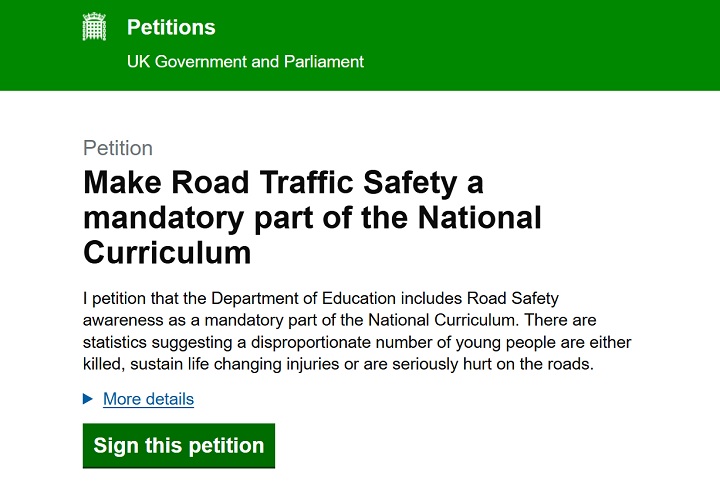
A petition, which calls for road safety education to become a mandatory part of the school curriculum, is beginning to gain traction.
The petition has been devised by Cllr Liz Childs from Central Bedfordshire Council, with the support of its road safety team leader, Joanne Glen.
It currently has nearly 650 signatures, requiring 10,000 for a Government response.
Click here to sign the petition.
The petition reads: “I petition that the Department of Education includes road safety awareness as a mandatory part of the National Curriculum. There are statistics suggesting a disproportionate number of young people are either killed, sustain life changing injuries or are seriously hurt on the roads.
“I believe that road safety is a vital part of every child’s education, but teaching it currently seems to be optional. As already stated, there is a high volume of road traffic accidents which can result in devastating consequences.
“I believe that our education system has a responsibility to protect lives, inform young people about inherent dangers especially given the distraction of mobile phones. Some 6th formers can drive to school, and I wish to see greater emphasis on ensuring their safety.”
Road safety stakeholders are encouraged to show their support, both by signing and sharing the survey.
As Child and Family Safety specialists, we fully support this petition.
Having trained over a thousand young people — novice drivers, learners, and those preparing to begin lessons—it’s clear that a critical gap exists in their knowledge of fundamental road safety.
Many are unaware of even the basics: how to choose a good driving instructor, what risks they face as new drivers, or even how to assert their right to stop and exit a vehicle safely without fear of embarrassment or peer pressure.
These are not trivial gaps — they are matters of life and death.
We covered this essential content in our Good Egg Driver programmes, which we delivered in schools, colleges, and workplaces across the country.
Time and again, we could see how eye-opening this training was for students. Many schools welcomed it, despite remaining optional.
One school I recall, however, initially declined a free, council-funded one-hour session, because they were ‘putting up the Christmas tree for the school dance’.
My appalled response was pretty unambiguous and they thankfully reconsidered, and ran the training. It was especially gratifying when they later thanked us for the rave reviews from their students.
If this kind of practical, potentially life-saving education were included in the National Curriculum, I have no doubt it would save many young and precious lives.
After all—what is the point of achieving good grades, only to lose your life in an avoidable road collision?
Janis James MBE, London
+2